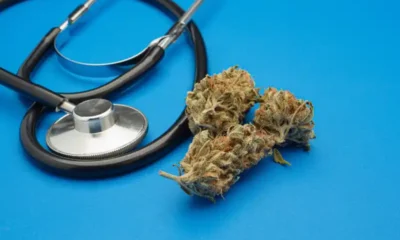Connect with us
Published
2 years agoon

As legal cannabis reform continues to flourish throughout the U.S., many are pointing to the plant’s potential to reduce or fully replace other medications, namely more addictive drugs like opiates. A 2022 study found that states with legal adult-use cannabis saw the volume of prescriptions within drug classes aligning with medical indications for pain, depression, anxiety, psychosis and seizures significantly declined.
However, another recent study published in the International Journal of Radiation Oncology Biology Physics offers additional insight. Researchers specifically looked at cancer patients who consume cannabis, finding that patients who recently used cannabis were more likely to have an active prescription for an opioid medication than patients who did not report recent use.
Researchers point to the prevailing conversation around cannabis and opiates, stating, “Some have suggested that cannabis may serve as an alternative to prescription medications such as opioids, benzodiazepines, and sleep aids for symptom management. We hypothesized that patients with cancer using cannabis would be less likely to have active prescriptions for these medication classes commonly used to manage pain, anxiety, and insomnia, respectively.”
To test their hypothesis, researchers gathered data on clinician-collected cannabis history involving adult patients in Michigan who were seen in an academic radiation oncology department between October 2020 and November 2021. Data were available for 3,059 unique patients, with 11.2% endorsing cannabis use in the last month, 7.7% with non-recent use (not within the last month) and 81.1% who had no history of cannabis use.
Of the cannabis consumers used in the data set, 46% smoked and 35% consumed edibles, with pain (27%) as the most common reason, followed by stress (18%) and anxiety (15%). Among those who have recently used cannabis, 6.1% used cannabis more than once a day, 54% used cannabis daily and 21% used cannabis at least weekly but not every day.
Ultimately, the researchers found their hypothesis was incorrect, as the patients were not only more likely to have active opioid prescriptions, they were also more likely to have an active benzodiazepine prescription. Researchers also stated that there was no relationship between sleep aid medication prescription and recent cannabis use.
The data doesn’t indicate that cannabis use eliminates the need for medications to manage pain or anxiety, so the report notes “that for many patients, cannabis is used as an adjunct alongside conventional, evidence-based therapies for symptom control and not as an alternative to such agents.”
With this in mind, the study concludes, suggesting that for many patients, cannabis is used as an adjunct alongside “conventional evidence-based therapies for symptom control and not as an alternative to such agents.” Researchers also noted that “patient education is key” to help patients with symptoms to locate “evidence-based therapies and optimize them for safety and efficacy as we await high quality evidence that supports or refutes the efficacy of cannabis for management of many symptom classes in patients with cancer.”
This topic has been explored before, with conflicting results.
One 2016 survey from the University of Michigan found that patients using medical cannabis to control chronic pain reported a 64% reduction in opioid use. Another 2019 study from the same university found that 44% of polled medical cannabis users stopped taking a pharmaceutical drug, or reduced their usage, or both, to use cannabis instead.
A 2021 Canadian study similarly concluded that cannabis significantly reduces prescription opioid use and improves quality of life over six months. Authors suggested that the high rate of cannabis use for chronic pain and the subsequent reductions in opioid use suggest “cannabis may play a harm-reduction role in the opioid overdose crisis, potentially improving the quality of life of patients and overall public health.”
Though, it should be noted that these endeavors are focused more broadly on medical cannabis users, not specifically cancer patients.
But that’s not all—to make matters more complicated, a May 2022 study conversely suggested that cancer patients using cannabis reported less pain and said the drug reduced their need for opiate painkillers. Researchers found that nearly half of the patients in the study reported they had stopped using analgesic painkillers after six months of medical cannabis use.
The truth is that we still have a lot more to learn. To truly uncover the answer, others have concurred with researchers of the new October study: More research is needed.


Carmelo Anthony Launches Cannabis Brand


Santa Barbara County Approves Study To Address Ongoing Cannabis Odor


Kansas Medical Cannabis Proposal Dead for 2024


Psychedelic Research Proves Rather Tricky for the FDA


Psychedelic Drug Market Poised to Hit $4.6B by 2030


Chronic Pot Use Has Minimal Effect on Motivation, Study Shows
